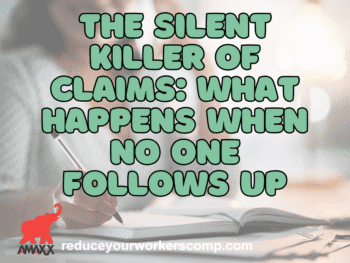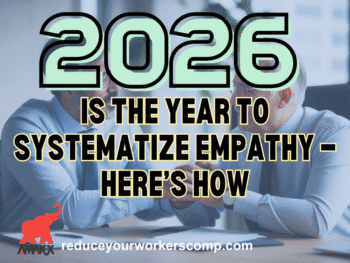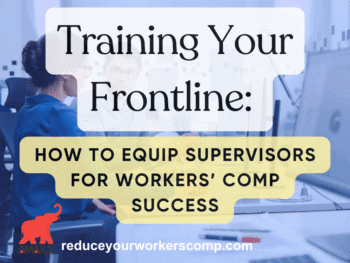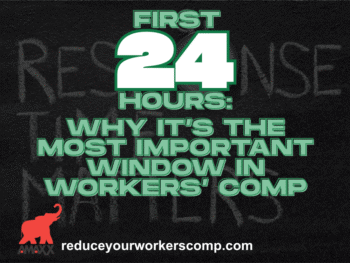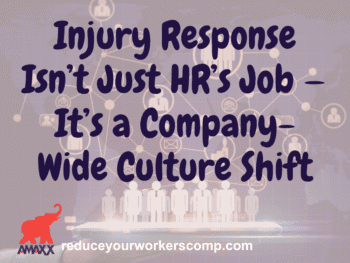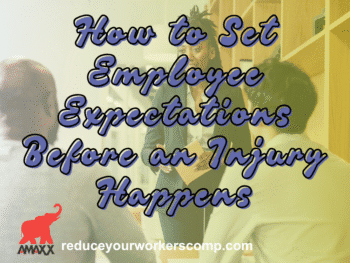
Employer Should Contact Injured Worker To Begin Caring & Trusting Relationship
The employer’s workers’ compensation coordinator should be in contact with the injured employee the day of the injury to begin to establish a caring and trusting relationship with the employee. By answering all of the employee’s questions about the workers’ compensation process and by showing the employee that the employee is important to the employer, the employee is much less like to develop animosity toward the employer over the accident.
Few employees will openly admit to themselves or to anyone else that it was their own carelessness that caused their injury. When there is no rapport between the employee and the employer, it is much easier for an employee to blame the employer for the injury, rather than to say ‘it was my inattention to what I was doing that caused me to get hurt’. When proper rapport with the claimant is established, the injured employee is much more objective about the cause of their injury.
When the workers’ compensation coordinator actively works with the injured employee to schedule medical care, to arrange light duty work, to answer any questions the employee has about the workers’ compensation claim process, and to reassure the employee that the employer has the employee’s best interest at heart, the course of the workers’ compensation claim is much smoother.
Fear Is Primary Reason An Employee Hires Attorney
Fear is the primary reason an employee hires an attorney following an injury. The employee can be fearful of one or more of the following concerns:
- The inability to support or provide for their family during the recovery time of the injury
- The inability to support or provide for their family in the future
- Losing their job due to their inability to work
- Being ostracize for causing the accident and the resulting injury
- Having a permanent impairment
- Having to pay the cost of the medical treatment
- Not knowing what to expect
It is often said the easiest way to lose control of the claim is to ignore the injured employee after the injury occurs. When the employer does not maintain rapport with the employee following an accident, the employee will find someone to answer his or her questions about the workers’ compensation claim process. If the person providing the answers to the employee is an overzealous attorney whose primary concern is maximizing the attorney’s income, the answers provided to the employee will be designed to drive a wedge between the employee and the employer. The attorney knows the employee may have some sense of loyalty to the employer, and it is important to the attorney to diminish that sense of loyalty, and to encourage the employee to try to get the maximum amount possible for the injury.
Communication Needs To Be Ongoing
Immediately following an injury, most employers reassure the employee that everything will be alright, that every problem will be taken care of. Unfortunately, most employers return to the daily activities of their business the day following a workers’ compensation injury, while the employee continues to deal with the injury aftermath for weeks or even months following the injury occurrence.
Rapport is maintained by regular, on-going contact with the injured employee. One of the Best Practices used by professional workers’ compensation coordinators is to request the injured employee to call in after each doctor’s appointment with a status update. This accomplishes several things:
- It keeps the employee in touch with the employer during the medical recovery process.
- It keeps the employer informed as to the exact medical status of the employee.
- It reassures the employee that the employer is concerned about the employee’s well-being.
- It allows the employer to coordinate the modified duty work with the limitations imposed by the medical provider.
- It keeps a high level of rapport between the employee and the workers’ compensation coordinator
- It allows the workers’ compensation coordinator to address any issues or concerns of the employee that develop during the course of the claim
When the employee has a high level of rapport with the employer’s workers’ compensation coordinator, there is a much lower chance that the claim will be contested. By establishing and maintaining rapport throughout the claim, the employer will experience a better overall outcome of the work comp claim.

Contact: RShafer@ReduceYourWorkersComp.com.
Workers’ Comp Roundup Blog: https://blog.reduceyourworkerscomp.com/
©2019 Amaxx LLC. All rights reserved under International Copyright Law.
Do not use this information without independent verification. All state laws vary. You should consult with your insurance broker, attorney, or qualified professional.

